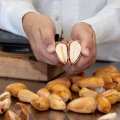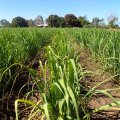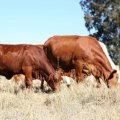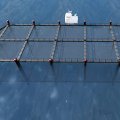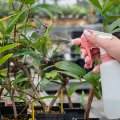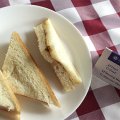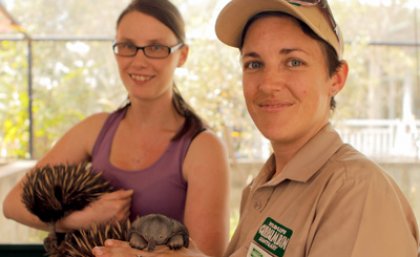
The impossible became the possible with the birth of four baby echidnas over the past two months at Currumbin Wildlife Sanctuary on the Gold Coast.
The four new echidna babies (called puggles) join two that were born last year as part of the echidna study program jointly run by The University of Queensland (UQ) and Currumbin Wildlife Sanctuary.
The births have confirmed the echidna breeding program as a world-leader and could help save the monotreme’s critically endangered cousins.
Reproductive biologist with UQ’s School of Agriculture and Food Sciences, Dr Steve Johnston, says echidnas have been notoriously difficult to breed in captivity.
“It was only a few years ago that it was thought to be almost impossible to breed echidnas in captivity and most births were somewhat accidental and unplanned,” Dr Johnston said.
“We had two puggles born last year and this year all five of the females have mated and four have produced puggles so far – we are still waiting for one more.
Less than 20 echidnas had previously been bred in captivity in Australia until Currumbin’s four puggles were born this year.
Having bred this notoriously difficult-to-breed species two years in a row, Dr Johnston believes the centre now has a sustainable captive breeding program.
Captive Breeding to Help Cousins from The University of Queensland on Vimeo.
While Australian native short-beaked echidnas, like those born at Currumbin, are relatively common in Australia, time is running out for their cousins, the endangered long-beaked echidnas found only in Papua New Guinea.
The aim of the Currumbin echidna research program is to learn to breed and perfect all aspects of husbandry of the short-beaked echidna and better understand its physiology and behaviour.
When this is done, it will hopefully lead to a future breeding program for its critically endangered cousins to try and help save the species.
UQ PhD student, Andrea Wallage, is hoping to solve some of the echidna’s mysteries with her research on their reproduction.
She is collecting data in conjunction with the dedicated Currumbin Wildlife Sanctuary keepers, Lindy Thomas and Lauren Clark, on the reproductive cycle of the males and baseline information on feed frequencies and weight.
“Although echidnas are common in Australia and are found from the highest mountains to the middle of the desert, they are very shy and there are still many unsolved mysteries about their life-cycle,” Ms Wallage said.
“For example, we don’t know how to tell what gender they are until they are a few years old without expensive DNA testing, we don’t know when they become sexually mature and we know very little about their reproductive cycles.
“It was thought that the females only have one puggle every three years, but we have now had a female produce a puggle two years in a row.
“We also discovered that the females can go through multiple ovulation cycles each season – one of our females showed signs of mating activity three times this season.”
Video cameras have been installed in the echidna enclosures to monitor this very shy species 24-hours per day to learn more about them and their breeding behaviour.
Director of Sales and Marketing at Currumbin Wildlife Sanctuary Mr Greg Daven said “it is very exciting the success that this breeding program has had over the last two years in particular.”
“The team here at the Sanctuary and UQ has worked very hard to unlock some of the mysteries surrounding the echidna’s breeding habits and we are now looking forward to being able to display these cute puggles so we can better educate the public on the plight of their cousin the endangered long beak echidnas,” Mr Daven said.
High resolution images are available here. This link expires on 14 December 2012.
Media contacts: The University of Queensland, Kathy Grube, 0418 524 297 or k.grube@uq.edu.au and Currumbin Wildlife Sanctuary, Nancy Ruscitti, 07 5534 0829 or nruscitti@cws.org.au



